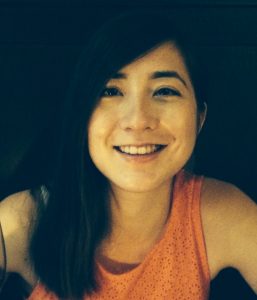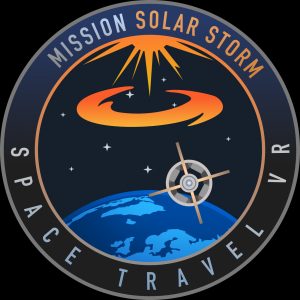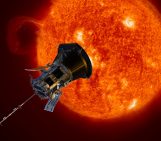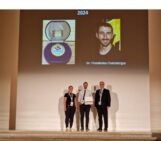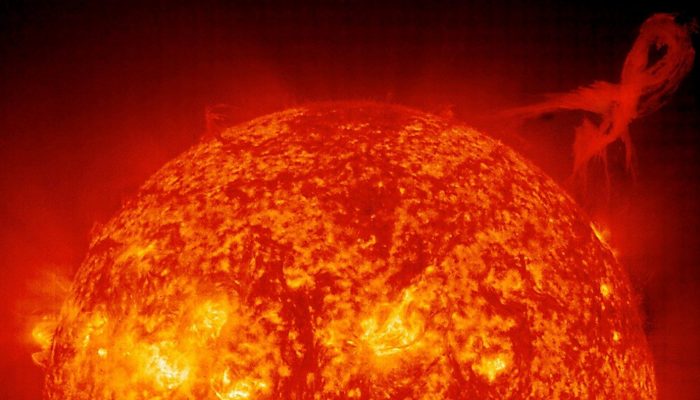
In this month’s (first ever for our blog) Life of a Scientist interview, we are very happy to talk to Dr Miho Janvier, a Researcher at the Institut d’Astrophysique Spatiale in Orsay (France), whose work has shed some light on the understanding of solar eruptions and coronal mass ejections (or solar storms) from their birth in the Sun’s corona to their evolution in interplanetary space. Additionally, Miho has actively taken part in Educational & Public Outreach efforts and has co-created an outreach project on Solar Storms using Virtual Reality technology.
Miho, can you please say a few words about yourself?
I am currently working as an associate astronomer at the Institut d’Astrophysique Spatiale in Orsay (France). My main research interests are the understanding of the fundamental mechanisms of how solar flares occur, and how to better characterize the solar storms they send in space. My research work is quite varied, as I get to work with computer simulations as well as space mission data, and for the analytical part, it’s back to pen and paper! I am also involved in the next European Space Agency mission to the Sun called Solar Orbiter: with the team at my institute, we are responsible for the operations that will be carried by one instrument (SPICE) onboard the spacecraft. I also teach at the University and am involved in outreach projects.
What is a “typical” day in the life of a scientist? Describe one of your “usual” days.
It is difficult to describe a usual day because every day happens to be completely different from another! When I am not at a conference, I generally check and answer the most pressing emails in the morning, while my favorite tea is brewing. I would generally dedicate a few hours for research before heading to lunch with my colleagues. I love these moments of socializing, as the rest of the day can be spent alone in front of a computer! Depending on the days, I may have a meeting in the afternoon, either to discuss the preparation of operations on our instrument for the Solar Orbiter mission, or to discuss new outreach projects, or to dedicate some time for the lab communication team, in which I am involved. This is also the time I answer emails that need a longer thinking time.
What do you want to achieve with your research?
First of all, satisfy my inner curiosity about the universe! This is the one reason I wanted to become an astrophysicist in the first place. Funnily, the more research I do, the more questions I have. It is a never-ending process. On a more practical level, I want my research to matter for different reasons. First, to better understand what it means to live in the neighborhood of an active star that is the Sun. Secondly, not only will this help us to build the tools for space weather forecasting that are important for human societies, it will also help us understand how planets in the solar system react to the Sun’s activity. And ultimately, this research will help assess the conditions of life in other star systems too.
Why did you become a scientist and what drew you to this field?
As a child, I was always fascinated by the night sky. But it is not until I turned 9 and discovered the TV show X-files that I became a big fan of aliens. It may sound weird, but that was my first motivation for becoming an astrophysicist! Of course, the word “aliens” may sound like a joke, but in the bigger picture, what I mean is that questioning the existence of life in the universe is, to me, one of the most fascinating questions in life.
Later in my studies, I really liked the aspect of plasma physics, where the behavior of an ionized “fluid” is affected by an electromagnetic field (and I did like working with Maxwell’s equations). I finished my PhD in plasma physics as the space telescope Solar Dynamics Observatory was in its first mission years, sending us extremely detailed images of the Sun and its beautiful eruptions. It just seemed natural to turn to solar physics!
What advice would you give to your younger self?
To be more confident about yourself, and for this, to build a support network along your career. A few years ago, I came across the expression “impostor syndrome” and realized that the pressure we have, as young scientists, can be daunting. As a woman in science, I also realized along the years that there are still a lot of stigmas and unconscious biases in science that can make you feel like you don’t belong to the field. Creating a network of colleagues, friends (and the two can intersect!) and self-care routines will help you go through the times when you have doubts.
What do you consider as the most surprising result in your research so far?
A few years ago, with the team I was working with at Paris Observatory, we analyzed the mechanisms happening during flares (what we call magnetic reconnection, in three dimensions). We expected a specific behavior of the Sun’s magnetic field in flaring regions from our numerical simulations. This was later confirmed with observations from the Solar Dynamics Observatory space telescope by one of our colleagues, who is indeed a keen observer!
What is it that you like to do when you aren’t working on research
Away from my desk, I love travelling. As a kid, I had the incredible chance to live in several countries on 3 different continents. So I get itchy feet when I am staying too long in the same place. I am just back from Tanzania, where I was lucky to walk with giraffes and bathe in turquoise waters: that definitely made me forget the Sun for a few days! Fortunately, as a scientist, I get to travel a lot for conferences and collaborations, so I get the best of both worlds. I love doing sport (from snowboarding to a more quiet yoga sessions), music (we have a secret band with some other astrophysicists friends, but I can’t tell you about it as it is secret!) and especially dancing.
Can you please explain the SolarStormVR project in more detail?
SolarStorm VR is a project I started when as I was living in Scotland. It started with me meeting a talented moviemaker and talking about doing a project together. I was interested in bringing storytelling as a way to communicate about the science we do, and we thought of using Virtual Reality to excite the young audience. We obtained some funding and spent countless nights working on the project. I keep a lot of good memories from it although it was quite strenuous! As I moved to Paris for my current position, I had to juggle my new science career with touring in science festivals to present our project, which meant a lot of sleepless nights. But the smiles on our visitors’ faces were totally worth it. The project is still alive throughout the website (www.solarstormvr.com) where anyone can either download the video or watch it on YouTube 360.
How important is science outreach to your career?
For me, it is very important for several reasons. First of all, I have a passion for what I do and I feel lucky to have a job that is more a passion than a work. In that respect, I want to share this passion because I find space awesome! Many times however I hear that “science is too complicated” or “I was bad in physics/maths”: for some, science seems like an obscure, incomprehensible field that is secretly kept away from the public in an ivory tower. I want to change that. Giving the chance to anyone to understand how science is being done, to make them participate, is allowing anyone to have critical thinking, which is even more important nowadays with unlimited access to real or fake facts on the Internet. And finally, in astrophysics, the majority our funding is public money. It is our duty as researchers to give back to the society that allows us to do the job we do.
Do you have any words of advice for students that would like to follow the scientist’s path
For young students: science literacy you already have, it is a skill you build. It requires hard work but I believe anyone can become a scientist. Don’t give up if it is your dream.For older students starting a scientific career (PhD students), same advice as my younger self: build a support network; don’t hesitate to ask people to mentor you if you feel you need it. You are in for the long run, so better work with people you trust, who can help you through tough times, and who you will be sharing a drink (or many) at conferences! Some of my best friends are in the field, and they make the job even better!

